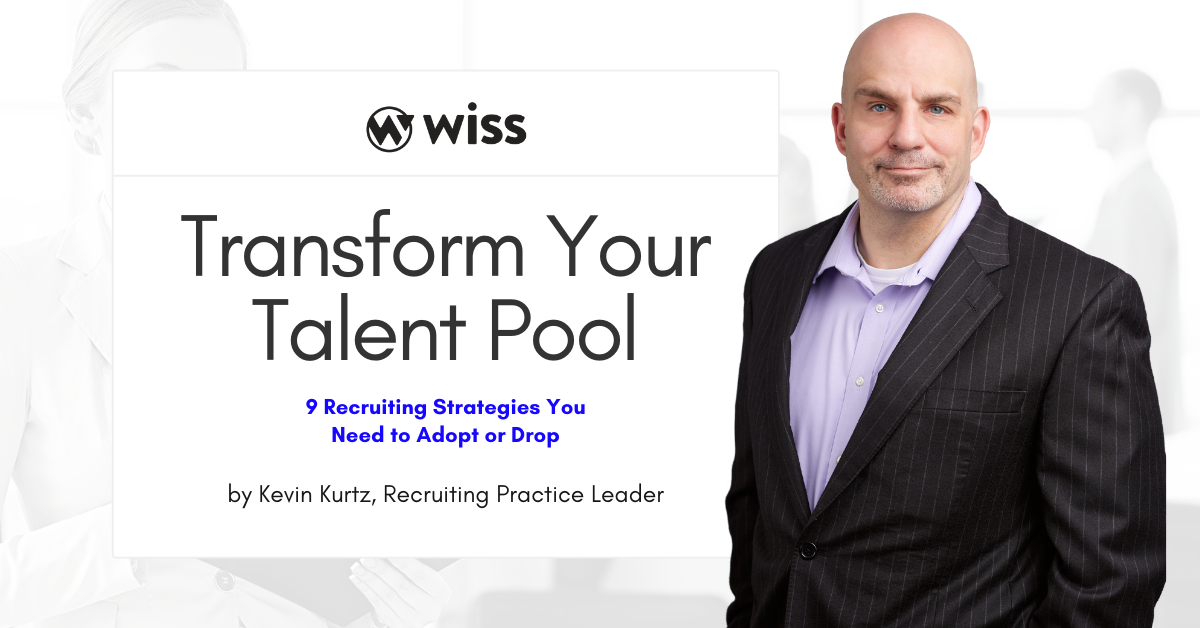Talent acquisition is the heartbeat and foundation of any organization, says Wiss’ Practice Leader of Recruiting Kevin Kurtz. Plus, its long-term success and sustainability is directly correlated to its talent.
Yet this is a ball many companies fumble, as attracting, developing, and retaining talent continues to be one of the biggest challenges organizations face.
That’s why recruitment and acquisition will always be a hot topic — one social media only continues to amplify.
On Episode Six of For Your EARS Only — Wiss’ exclusive 10-episode private podcast — Kevin shares how platforms such as LinkedIn and Glassdoor give candidates an outlet to share their positive and negative experiences about a company’s culture, compensation, interview process, training and development, and more.
To keep up with what candidates value most, interview processes (what he considers the most talked about topic on LinkedIn) have to pivot when necessary and remain open-minded to keep up with a fluid talent pool.
Now that it’s not just about compensation anymore, here’s how companies can work to attract the best talent.
Shifting with the post-pandemic talent acquisition landscape
Despite its worldwide devastation, the COVID-19 pandemic presented clear silver linings — such as the ways Kevin says it forced businesses to ditch archaic talent acquisition methods and pivot to more effective strategies sooner than intended. (Goodbye to six interview rounds; hello to virtual meetings.)
Pivoting your recruiting methods — but not without flexibility
Before the pandemic, many companies focused on engaging and retaining existing talent, because that was harder than hiring new talent in a world where hiring practices skewed in companies’ favor. But post-pandemic, the focus has shifted to attracting and winning new talent, because job seekers are much more selective post-pandemic.
Companies face an entirely new challenge and recruiting dynamic — especially those with old-school, bodies-in-chairs mindsets, says Kevin.
In a job market where people are likely to ask about office safety protocols before salary, the key to navigating change is innovation. And throughout the pandemic, Wiss hasn’t missed a beat.
To shift with the times, Wiss:
- Pivoted to a 100% virtual interview and onboarding process.
- Hosted virtual career fairs for colleges to continue building a footprint within its internship program.
Most of all, Wiss prioritized flexibility — because in a time where nothing feels normal, being able to roll with the punches keeps candidates interested.
Abandoning lengthy and in-person interviews
Pre-pandemic interviews were drawn out, time-consuming processes. Candidates had no choice but to resign to six-week-long interview processes that included multiple on-site rounds requiring candidates to burn PTO without any guarantees of getting an offer.
It’s no wonder Kevin reports that one of the biggest challenges he sees is that candidates lose interest in the process over time.
The eye-opening experience that was the pandemic introduced the efficiency of virtual hiring processes, a solution Kevin explains improves the candidate experience.
For example, rather than scheduling on-site interviews for each round, save your candidate from taking (read: wasting) personal days and do it over the phone, Zoom, or Microsoft Teams.
Not only do virtual meetings promote safety, but without large gaps taking up so much space, Kevin says they also help facilitate a more efficient interview process and shorten hiring decision time.
And that alone keeps candidates more engaged.
Plus, here’s the kicker: According to Kevin (who can’t stress this enough), you’ll never attract high-caliber talent with inflexible and rigid practices. Heck, you might not even retain your current talent if internal applicants can get through the interview process somewhere else faster than they can your internal one.
Fishing with a wider net — though cautiously
Beyond seizing the pandemic as a time to be more innovative, Kevin also viewed it as a chance for opportunistic hiring.
On a small scale, the availability of new perks such as part- or full-time remote work enabled Kevin to expand his talent search from a limit of 25 miles to 50. And on a larger scale, he and many other companies got to join the big leagues: out-of-state recruiting.
From a talent perspective, Kevin shares that being able to recruit within a broader radius is a game-changer.
However, things can get a little complicated when you cross state lines.
Finding solid out-of-state candidates is half the battle — but do you know how you’ll consider the compensation range differences? After all, the salary you’d offer someone in Kansas differs from what you’d offer a New Jersey resident. Plus, if you offer remote work, will you extend that arrangement to current local talent, too?
National recruiting is more complex than people assume, says Kevin. Albeit advantageous, it involves a lot of balance and consideration.
Welcome to a new job market — attracting the cream of the crop
Want to know what people are done with? Applying to every available job just because, or strapping themselves to jobs that don’t fit their lifestyle.
In today’s job market, candidates hire companies as much as companies hire candidates. Plus, integrity, culture, and flexibility matter nearly just as much as compensation.
To impress the young, talented candidates that’ll lead the future of your organization, here are the right values to invest in.
Encourage work-life balance (and mean it!)
Number one: There’s no such thing as work-life balance without a flexible and hybrid work arrangement, especially as workers become digitally attached to work ’round the clock.
Kevin points out that people need to be encouraged to have lives outside of work — and it’s clearly what they want: In a PwC study, Millennials At Work, 95% of the surveyed millennials said work-life balance is important to them.
See? Your dream candidate wants to work for someone who advocates for self-care.
That’s why, to let them know he cares, Kevin tells candidates how the company encourages employees to volunteer or take vacations and that he supports parents attending middle-of-the-day school presentations or afternoon sports games — all guilt-free. (Because no one should feel bad for taking time off.)
To show fresh talent you care about more than just the work, share your commitment to balance during the interview process.
Create a ladder to climb
Here’s another statistic, this time from LinkedIn’s 2019 Workplace Learning Report: 94% (!) of employees said they’d stay with a company longer if it invested in their learning and development.
Now more than ever, candidates — especially younger ones — want to diversify their skills through professional development, and they don’t want their careers to be pigeonholed by an organization with no runway for growth.
In Kevin’s expert opinion, the best organizations cultivate talent from within and supplement talent externally to fill specialized/niche positions. I liken it to building a professional sports team. You build through the draft and develop your talent from within and supplement that talent via trades and free agency. To win consistently, you must build and develop from within. Your talent pipeline is going to help your organization achieve long-term SUSTAINABLE success.
To ensure candidates you can invest in them and provide the tools they need to grow and develop professionally, start here:
- Have a structured approach to learning and development (and not a fly-by-the-seat-of-your-pants plan.)
- Promote your willingness to invest in advanced certification or education credentials, whether it’s something like a business degree or a certificate.
- Offer technical and non-technical in-house training (e.g., soft skills or leadership opportunities).
Well, don’t just stand there — find your purpose!
Another thing top candidates want? Employers with purpose.
Kevin describes a purpose-driven company as one that shows a direct connection to helping people and adding value.
Beyond your services or products, candidates are interested in how you give back and serve your community. They want to work for a mission rather than a sales goal, and for an organization that leads with an entrepreneurial mindset that embraces new ideas. (And it can’t just be lip service.)
At Wiss, Kevin says recruiters tell candidates about the company’s volunteer activities with Habitat for Humanity or Moorestown Market.
Plus, to stand out from the competition and draw candidates in, recruiters share personalized videos of practice area leaders explaining their expertise and highlighting company culture.
Prioritize Diversity, Equity, and Inclusion (DEI)
Tackling DEI isn’t just a switch you can flip, says Kevin. It’s a total shift in mindset that has to start from an educational standpoint.
On top of that, you need to be committed to it — just like Wiss commits to attracting and developing diverse candidates at the beginning of their careers into its industry.
If you need a starting point to invest in DEI, take Kevin’s advice: Acknowledge your organization’s need to address this, then take inventory of your current practices and approach.
Next, ask these questions:
- How can we impact DEI?
- What can we do differently?
- Where do we fall short?
- What doesn’t work with our approach?
- What else can we do?
Kevin says you have to be willing to ask these tough questions and accept the answers of where you might be falling short.
When you can at least acknowledge there’s more you can do to lead an equitable and inclusive hiring process, you’re on the right path to asking the right questions (and finding the right answers).
Hooking candidates with a stellar candidate experience
If you want the best, it has to start with you. Here’s how to put your best foot forward, from the moment you begin your search.
Emphasize the ‘human’ in HR
Some AI-based recruiting platforms help manage talent engagement and communication, or they keep interview processes on track. Others help you find the unicorn candidate that checks all your boxes.
However, here’s Kevin’s perspective: No AI tool can substitute human interaction. At best, it’s a worthy supplement.
Throughout the pandemic, he says many organizations realized they’d either undervalued or poorly staffed their talent acquisition and HR teams — and that recruiting talent is about more than posting on Indeed or ZipRecruiter. (Go figure.)
To find and engage the right candidates, strengthen your internal talent acquisition strategies or find a consultative partner to source the talent for you.
There has to be a balance between the human and analytics experience, says Kevin. Because although it provides value, only betting on AI means taking a shortcut and doing yourself a disservice.
Create an engaging candidate experience
While the candidate experience has multiple touchpoints, Kevin explains that it begins from the first outreach, whether you call, email, or send a LinkedIn message or carrier pigeon.
At Wiss, Kevin is the first touchpoint for candidates, which also makes him the company’s advocate and ambassador — and if he leaves a lousy impression, it’s likely he loses them. You only have one true opportunity to make an amazing first impression!
Here are some of his key points for creating a well-rounded candidate experience:
- Maintain consistent communication during the process.
- Provide clarity around expectations and what the process looks like.
- Pick the right co-interviewers and decision-makers, and assess their behavior. (Heads up: Their attitudes toward candidates can negatively impact the interview experience.)
Besides that, Kevin says it all comes down to how you treated them. At the end of the day, your talent pool comprises human beings, and they deserve respect.
This article is based on an episode of For Your EARS Only, the limited-run, 10-episode podcast series created exclusively for Wiss clients.

 Previous
Previous






